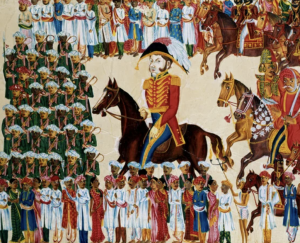Never had Britain had such an abundance of clever, zealous young men, itching to liberate Asia from the grip of superstition and disease.
英国从未有如此多聪明而狂热的年轻人,渴望着能解放亚洲,让它摆脱迷信与疾病的困扰。
In the Governor General of India, Lord William Bentinck, they'd found an ardent patron.
印度总督威廉·本廷克勋爵,即是一位热情的赞助人。
Even the most dedicated pilgrims in search of the relics of the Raj are not going to make a beeline for this statue.
即便是最热诚专注的朝圣者,寻找印度在英国统治下的遗迹时也不会直奔这座雕像。
I don't suppose anybody in this park really knows who Lord William Bentinck really was.
我觉得这座公园里没有人会知道威廉·本廷克勋爵究竟是个怎样的人。
You have to look at the figures in the frieze here to see why he raised commemoration.
你得看看这雕塑中的人物,才知道为何要纪念他。
Bentinck was the first of the authentic do-gooder Governors General, and the kind of person he wanted to do good to was this young woman in distress in the middle of the sculpture group.
本廷克是第一位真正主张积极行善的总督,而他行善的对象就是这幅雕像中间的这位悲伤的女人。
She's a young widow and she's about to join her husband in a joint cremation, the traditional Hindu practice of suttee.
她是个年轻寡妇,她马上就要和他丈夫一起火葬了,这是传统印度教里的寡妇殉葬习俗。
Unlike an older generation of British in India, the likes of Macaulay and Bentinck knew next to nothing of this kind of tradition,
不同于生活在印度的老一辈英国人,像麦考莱和本廷克这些人根本不了解这种传统,
nor would it have made any difference if they had, but they knew an abomination when they saw it.
即使知道也不会有任何意义,因为当他们看到时立刻心生厌恶。
Never mind that there were only 500 cremations a year, the campaign to abolish suttee was the campaign of their dreams, and they went about it with a will.
虽说一年只有500人陪葬,他们依然梦想着废除寡妇殉葬,并毫不犹豫地投身了废除运动。
Volumes were written by missionaries, committees deliberated in parliament, a law was passed and inspectors were dispatched to intercept widows en route to the funeral pyre.
传教士写下了成卷的书,委员会在议会里深思熟虑后,通过了一条法律并立刻派遣巡官去阻止正前往火葬途中的寡妇。
The 1830s were a crossroads in the young life of the liberal empire.
19世纪30年代,这个新生的自由国家站在了十字路口上。
Did the welfare of our native subjects oblige us to impose the values of the west on the east, or should we be rebuilding and reinvigorating Asian culture and society?
我们提供给当地国民的福利,需要我们把西方价值观强加在东方观念之上,还是应该重建和复兴亚洲的文明和社会呢?
Charles Trevelyan, another high-minded young reformer, who was courting Macaulay's sister, was in no doubt at all which road to take.
查尔斯·屈维廉也是目标远大的年轻改革者,正在追求麦考莱的妹妹,他很清楚该走哪条路。

The more British India could become, the better.
印度变得越英国化,就越好。
For Macaulay and Trevelyan, the country would be turned into one vast schoolroom. Teaching for them was not just a job.
对于麦考莱和屈威廉,整个国家将变成一间巨大的教室。对他们来说,教育不仅是一份工作。
Western education was the instrument by which India was going to be transformed from a world of bullock carts and beggars into the progressive Victorian dynamic world of the telegraph and the locomotive.
西方教育将把印度从一个牛车与乞丐遍地的世界,转变成拥有电报与火车前进中的充满活力的维多利亚国度。
English would be a way to bring Indians, divided by so many faiths and languages, together.
有着这众多信仰和语言隔阂的印度人民,将在英国人带领下重新团结在一起。
And it would help bridge the culture gap between Europe and the subcontinent.
也能在欧洲与次大陆之间建起文化的桥梁。
To those who said, "You're destroying their own culture", Trevelyan replied that Hinduism was identified with so many gross immoralities and physical absurdities that it gives way at once to the light of European science.
对于"你们在毁灭他们自身的文化"的说法,屈威廉答道,印度教充斥着道德劣根性和荒谬行为,应立即让位于先进的欧洲科学。
What here we are, on the veranda. Late afternoon, the perfect imperial time of day.
傍晚时分,我们来到这个阳台。这是帝国一天中最好的时光。
This is the time when words like veranda and bungalow enter the British vocabulary.
类似"阳台"和"平房"等词就是在此时融入了英语。
They would make you think that the world that the sahib built for themselves was a marriage between an Indian and a British lifestyle.
这些词语会让你觉得欧洲人在这里为自己建造的世界,结合了印度与英国的生活方式。
A bungalow, after all, was a one-storey Indian dwelling. But it wasn't really like that at all.
毕竟平房是只有一层的印度式住所。但事实并不是这样。
What the British had done with the bungalow, made a life for themselves that was as much as possible like the life of a country gentleman in Buckinghamshire, Hampshire or Lancashire.
英国人用平房为自己创造的生活,与在白金汉郡、汉普郡和兰开郡乡绅的生活方式相差无几。
So instead of the bustle of an Indian courtyard, with animals inside it and washing and cooking going on, we have the rose garden, the well-kept hedges, the strictly-disciplined gardeners.
印度人民在庭院里养动物、洗衣和做饭,与这种喧闹的生活截然相反,我们拥有玫瑰花园,井井有条的树篱和训练有素的园丁。



